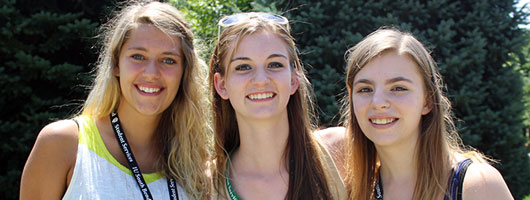 Common Core Courses (12 cr.)
Common Core Courses (12 cr.)
Common core courses are designed to give greater coherence to the general-education experience at IU South Bend by demonstrating the productive relationships among disciplines and by emphasizing the value of fundamental literacies from the general-education curriculum. The four common core courses, each of which is offered in several disciplines under specific departmental codes, introduce students to many of the essential intellectual themes of the four broad (and not mutually exclusive) groupings of disciplines.
Students must complete one course from each of the following four areas, as designated in the Schedule of Classes. At least one of the areas must be completed at the 300-level.
Common core 300-level courses may have as prerequisite the completion of one or more of the fundamental literacies requirements, and in some cases other prerequisites may also apply.
The Natural World
This core course introduces students to the methods and logic of science and helps students understand the importance of science to the development of civilization and to the contemporary world. It serves to provide a context within which to evaluate the important scientific and technological issues we face in modern society. Although all sections of The Natural World bear the same title, the content and specific focus of the course varies; each section has a specific subtitle that indicates its particular content and focus. Courses at the 100-level bear the designation N 190 (for instance, BIOL-N 190 The Natural World), and the 300-level Natural World courses appear in the Schedule of Classes as N 390 offerings in the specific disciplines.
Select N 190 or N 390 from ANTH, AST, BIOL, CHEM, CSCI, GEOL, MATH, PHYS, or in any other field in which a course in this category may appear, as designated in the Schedule of Classes.
Human Behavior and Social Institutions
This course introduces students to the distinctive perspectives the social sciences employ in building an understanding of our world. The course also focuses on the individual in relation to and as a product of that social world. It requires students to develop an appreciation of the processes of social interaction and emphasizes the analytic frameworks and techniques social scientists use to explain the causes and patterns of individual and institutional behavior. Although all sections of Human Behavior and Social Institutions bear the same title, the content and specific focus of the course varies; each section has a specific subtitle that indicates its particular content and focus. Courses at the 100-level bear the designation B 190 (for instance, SOC-B 190 Human Behavior and Social Institutions), and the 300-level Human Behavior and Social Institutions courses appear in the Schedule of Classes as B 399 offerings in the specific disciplines.
Select B 190 or B 399 from ANTH, BUS, COGS, GEOG, POLS, PSY, SOC, SPCH, SUST, WGS, or any other field in which a course in this category may appear, as designated in the Schedule of Classes.
Literary and Intellectual Traditions
The various versions of this course focus on a topic that can be addressed from more than one disciplinary perspective, and explores ways in which the principal disciplinary approach can be augmented and enriched by readings from other disciplines. Although all sections of Literary and Intellectual Traditions bear the same title, the content and specific focus of the course varies; each section has a specific subtitle that indicates its particular content and focus. Courses at the 100-level bear the designation T 190 (for instance, HIST-T 190 Literary and Intellectual Traditions), and the 300-level Literary and Intellectual Traditions courses appear in the Schedule of Classes as T 390 offerings in the specific disciplines.
Select T 190 or T 390 from ENG, CMLT, FINA, FREN, GER, HIST, HPSC, JOUR, MUS, PHIL, PSY, SPAN, TEL, THTR, WGS or in any other field in which a course in this category may appear, as designated in the Schedule of Classes.
Art, Aesthetics, and Creativity
This course explores the human need to experience and comprehend the creative process. It encourages students to experience culture and cultural artifacts as makers, performers, and audiences. Students gain familiarity with the discipline and craft by which artists and performers achieve their characteristic effects, as well as the satisfaction inherent in that process. Versions of this course explore the role of art, music, theatre, and other artistic modes in the formation and expression of a particular culture and encourage respect for diverse cultures and the artifacts they produce. Although all sections of Art, Aesthetics, and Creativity bear the same title, the content and specific focus of the course varies. Each section has a specific subtitle that indicates its particular content and focus. Courses at the 100-level bear the designation A 190 (for instance, FINA-A 190 Art, Aesthetics, and Creativity), and the 300-level
Art, Aesthetics, and Creativity courses appear in the Schedule of Classes as A 399 offerings in the specific disciplines.
Select A 190 or A 399 from ANTH, CMLT, ENG, FINA, INMS, MUS, THTR, or in any other field in which a course in this category may appear, as designated in the Schedule of Classes.